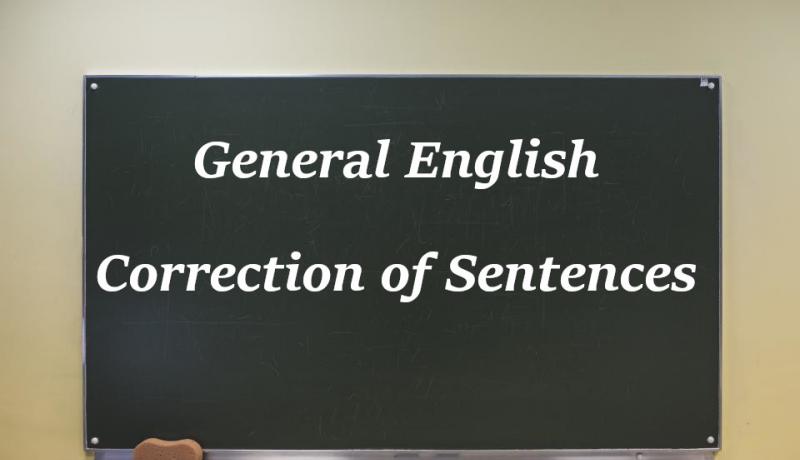1) Correct the sentence if necessary.
One should respect his elders.
A) One should respect his elders.
B) One should respect her elders.
C) One should respect one's elders.
2) Correct the sentence if necessary.
One should respect his own country.
A) One should respect his own country.
B) One should respect her own country.
C) One should respect their own country.
D) One should respect one's own country.
3) Correct the sentence if necessary.
One must love his parents.
A) One must love her parents.
B) One must love his parents.
C) One must love their parents.
D) One must love one's parents.
4) Correct the sentence if necessary.
I and Jimmy went home.
A) I and Jimmy went home.
B) Jimmy and I went home.
Explanation:
The second person should come first. The third person should come second. First person should come last.
5) Correct the sentence if necessary.
I and She are friends.
A) I and She are friends.
B) She and I are friends.
C) She and me are friends.
6) Correct the sentence if necessary.
I and Dhone went to college.
A) I and Dhoni went to college.
B) Dhone and I went to college.
C) Dhone and me went to college.
7) Correct the sentence if necessary.
Both he and you must attend the meeting.
A) Both he and you must attend the meeting.
B) Both you and he must attend the meeting.
8) Correct the sentence if necessary.
Peter invited me and you to dinner.
A) Peter invited you and me to dinner.
B) Peter invited me and you to dinner.
9) Correct the sentence if necessary.
I, you and she can do it.
A) I, you and she can do it.
B) You, I and she can do it.
C) You, she and I can do it.
D) She, you and I can do it.
Explanation:
2nd person. 3rd person. 1st person.
10) Correct the sentence if necessary.
None of the three questions are simple.
A) None of the three questions are simple.
B) None of the three questions is simple.
Explanation:
Neither is singular. Use a singular verb.
11) Correct the sentence if necessary.
None of the two answers are correct.
A) None of the two answers are correct.
B) None of the two answers is correct.
C) Neither of the two answers is correct.
Explanation:
None or Neither is singular. The word, None is used with more than two things.
12) Correct the sentence if necessary.
Neither of the three students have done their homework.
A) Neither of the three students has done their homework.
B) Neither of the three students have done their homework.
C) None of the three students has done their homework.
D) None of the three students have done their homework.
13) Correct the sentence if necessary.
Every player must bring their bats.
A) Every player must bring their bats.
B) Every player must bring his bat.
C) Every player must bring her bat.
14) One of the boys are absent.
A) One of the boys is absent.
B) One of the boys are absent.
C) One of the boy is absent.
15) Every one of them have brought their bags.
A) Every one of them have brought their bags.
B) Every one of them has brought his bag.
C) Every one of them has brought her bag.
16) Either of the two answers are correct.
A) Either of the two answers are correct.
B) Either of the two answers is correct.
17) Neither of the two girls have done their homework.
A) Neither of the two girls have done their homework.
B) Neither of the two girls has done their homework.
C) None of the two girls has done their homework.
18) None have attended the party.
A) None has attended the party.
B) None have attended the party.
19) Each of the guards were doing their duty.
A) Each of the guards were doing their duty.
B) Each of the guards was doing his duty.
C) Each of the guards was doing her duty.
20) Everyone is eager to occupy their seats.
A) Everyone is eager to occupy their seats.
B) Everyone is eager to occupy his seat.
C) Everyone is eager to occupy her seat.

